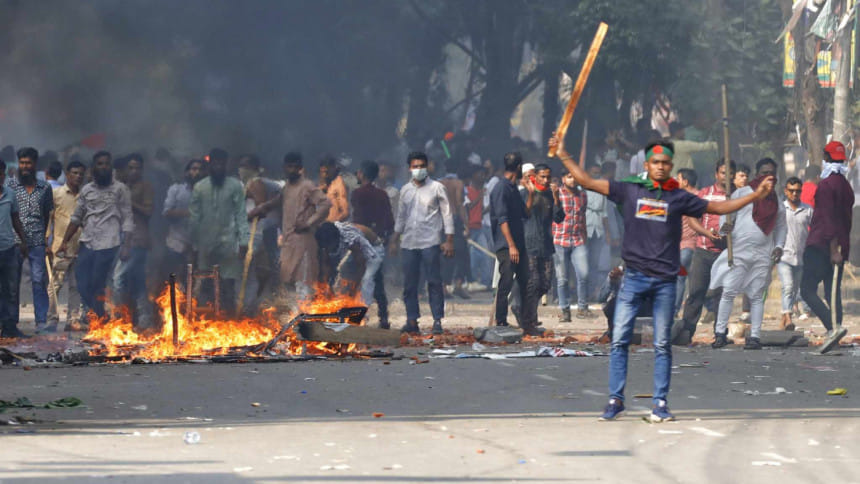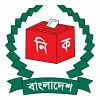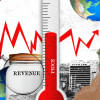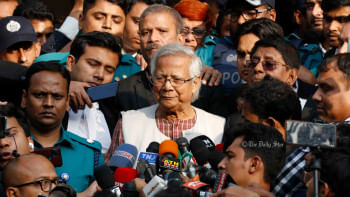A year shuttling between hope and despair

Bangladesh steps into the New Year under the shadow of persistent economic turmoil and political crisis over the January 7 national election.
Amid the economic woes stemming from the coronavirus pandemic and global supply chain disruptions caused by the Russia-Ukraine war, Bangladesh swayed back and forth between progress and turbulence, prosperity and uncertainty in 2023.
It was the year that saw completion of various landmark infrastructure projects that were taken years ago. Mega projects like Dhaka Elevated Expressway, Metro rail, Bangabandhu Tunnel, a new terminal at Dhaka airport, and railway station in Cox's Bazar marked a major leap for the transport sector and promised an upward trajectory for social standards.
Big projects, however, may become a headache for the government in the coming years when the debt burden gets heavier.
"There was a political reason behind the inauguration of the development projects. Some were partially, and some were fully functional. Those projects will have a positive impact on the infrastructure of the country," Mustafizur Rahman, distinguished fellow at the Centre for Policy Dialogue, told The Daily Star.
"Pressure on paying the interest of the loans taken for big development projects will continue to mount in the coming days. It remains to be seen how much dividends the big projects return," he said.
As economic perils deepened in 2023, Bangladesh grappled with a formidable foe: surging inflation. Like a relentless tide, it eroded the purchasing power of the citizens, casting a shadow of uncertainty over daily life. For millions of people, the year has been a constant struggle to make ends meet, a tightening of belts, and a shrinking horizon of hopes and dreams.
And the ripples of inflation reached far beyond the kitchen. Transport costs soared, power tariffs went up, and rents climbed, making the cost of living a central economic issue. Despite the government intervention to check the prices, the number of people queuing up behind trucks for subsidised food only grew as days went by.
The market remained volatile with prices of kitchen staples like onion, potato and egg registering records. The ultimate burden was on the general public.
Consumer rights advocates blame the government regulators' lax enforcement of laws. It made the consumers pay high prices for both imported and locally produced goods. There is barely any hope that the prices will come down anytime soon.
One of the most-talked-about subjects in Bangladesh was depleting foreign exchange reserves. At one point, the central bank's dollar pile reduced to half of what it was two years ago before edging closer to a relatively comfortable level.
The year saw heightened political tensions, with concerns over fair elections, mass arrests of leaders and activists of the opposition camp, and shrinking democratic space dominating the public discourse.
For the BNP, which was struggling to even gather enough resolve to be on the streets in the first half of 2022, the bygone year was a comeback of sorts. The year also saw a revival of hartal and blockade enforced by the BNP and its like-minded parties.
The party that started the movement in the later part of 2022 over the price hike of fuel and daily essentials, and power outage carried it forward throughout the most part of 2023, holding rallies and demonstrations across the country despite arrests of its leaders and activists. As the movement was gaining momentum, the BNP wanted to hold a grand rally to stage a massive demonstration on October 28. But the event ended in clashes between the BNP activists and police accompanied by the ruling party men.
Since then, many of their party colleagues have been arrested, jailed, or went into hiding as law enforcers launched a crackdown. BNP and its like-minded parties enforced hartal and blockades to press home their one-point demand of election under a nonpartisan interim government.
As a result, the country entered a spiral of violence which further intensified after the Election Commission on November 15 announced the national polls would be held on January 7, 2024. Although the spectre of hartals and blockades failed to cripple normal life, the unrest put the economy under pressure with the transport sector facing a serious setback.
For the ruling Awami League, the year has been challenging as it had to face opposition movement and the pressure from the international community for holding a free and fair election. The party successfully cornered the opposition after the October 28 rally was foiled and took the country towards the election dismissing the call for dialogue among major parties. The AL started the election campaign to form the next government.
As the BNP boycotted the election, the main challenge of the AL is to make the election competitive. That's why the ruling party allowed its leaders to participate as independents. Violence has already marred the campaign as the incidents of attacks and clashes between the supporters of AL nominees and the so-called AL independents are reported in various parts of the country almost every day.
"2023 was the year of hope and despair at once. The hope was that this would be the year when the democratic backsliding would be reversed, as people of the country began to break the culture of fear and stand up for their rights," said Ali Riaz, a distinguished professor of political science at Illinois State University.
But it is ending with despair because the ruling regime has "chosen not to heed the people's aspirations. It rather doubled down the path of authoritarianism, the path of coercion", he told this newspaper.
Bangladesh is standing "at the edge of a precipice. The coming days and weeks may not only decide the trajectory of politics, but also the nature of the republic."
As we start 2024, it is likely that Bangladesh will experience a period of economic turbulence. How the country deals with the challenges of balancing economic growth with social development and ensures political stability will determine its future.


 For all latest news, follow The Daily Star's Google News channel.
For all latest news, follow The Daily Star's Google News channel. 









Comments